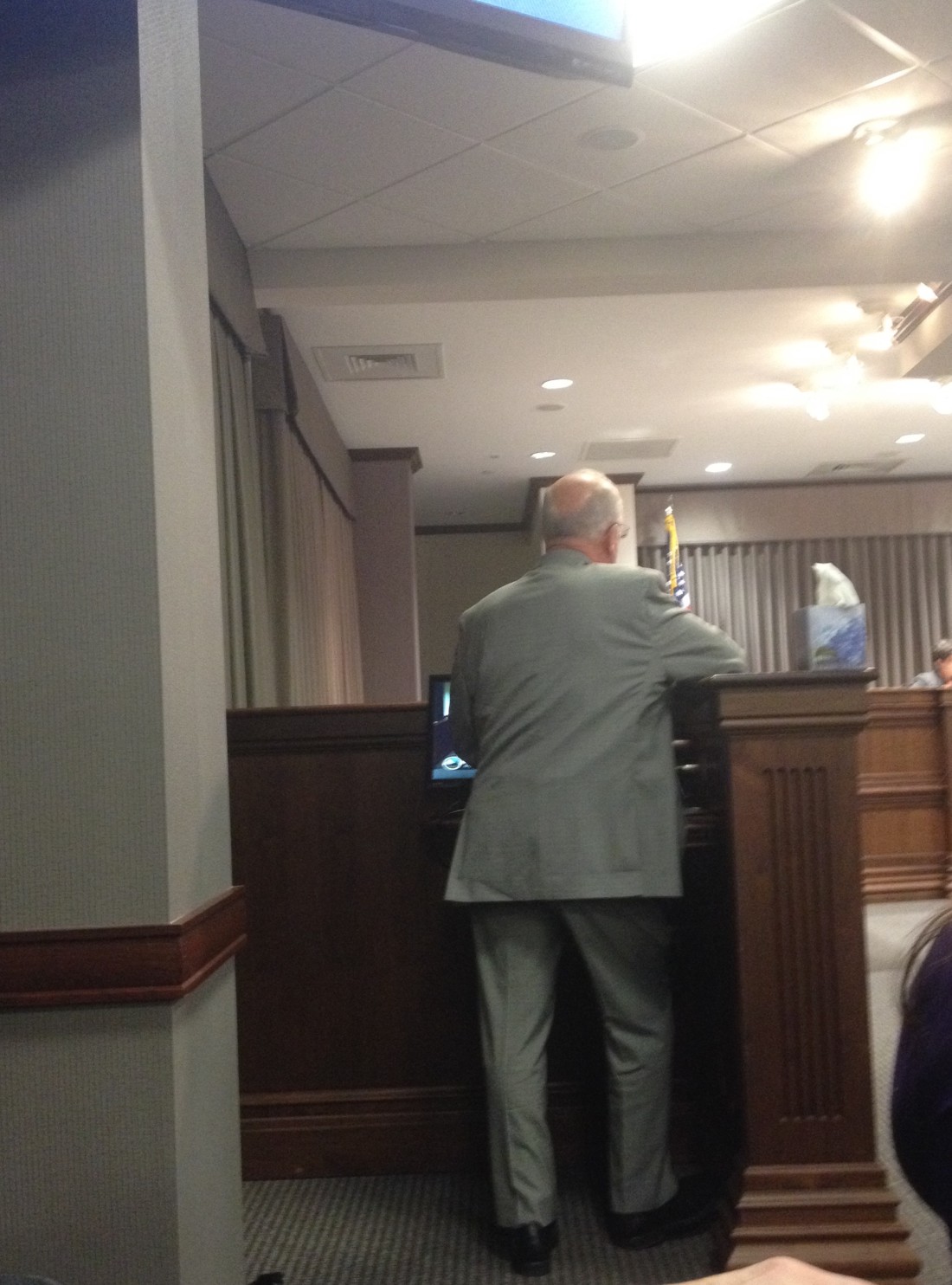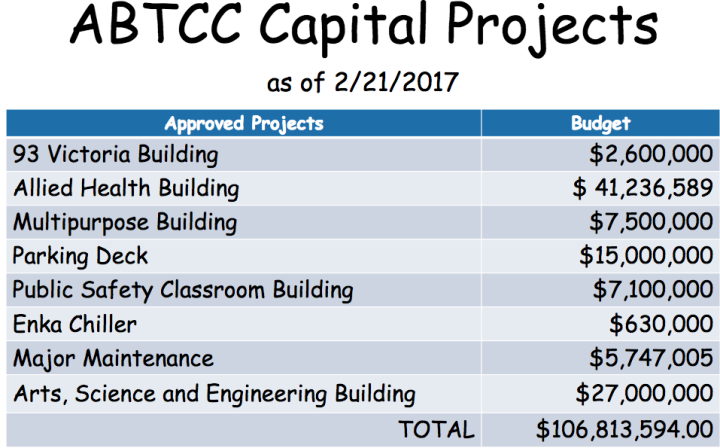“I have been through a lot of presentations, and normally it’s pretty easy to follow. This has been the most difficult one I have ever encountered” — Commissioner Al Whitesides
The Buncombe County Board of Commissioners appeared underwhelmed with a capital projects update from A-B Tech President Dennis King at the end of its nearly six-hour meeting Tuesday, Feb. 21. The agenda item also featured a surprise presentation from Commissioner Mike Fryar, who is on the community college’s board of trustees, leading commissioners to unanimously vote for King to come back to their next session and more adequately answer questions about costs, classroom space, minority employment, implementing new programs and other issues.
King’s presentation stems from a January request by commissioners for him to appear before the board, when they unanimously approved a moratorium on all A-B Tech capital funding. That funding comes from a quarter-cent sales tax approved by voters (by a 503 vote margin) in 2011. The tax is slated to sunset in 2029. Last year, Xpress tried to obtain emails surrounding the campaign to approve that tax but was told they did not exist, which led Xpress to investigate how the school stores records.
County Manager Wanda Greene kicked off the presentation by giving an update on the overall costs of A-B Tech’s capital plan. Originally, it was to cost nearly $81 million, but some buildings were deemed too expensive to renovate, and the latest price tag is nearly $107 million. Major maintenance costs, to the tune of nearly $6 million, have also increased the monetary needs.
Currently, the school is asking for funding for an arts, science and engineering building that would provide 99,000 square feet and cost $27 million, with $2.2 million already spent on the project.
King started his presentation by touting the community college’s benefit to the region, stating that it serves 23,000 students a year and has a collective impact of $356.7 million, according to 2012-13 data from Emsi, an economic data company. “The current number is obviously much larger,” said King. Other statistics cited by King assert that the school’s alumni contributed nearly $297 million to the economy, that college operations added $51.7 million to the service area economy and taxpayers get a $4.20 return for every dollar invested in the school.
King went on to make his case for the new ASE building, noting that student enrollment is outpacing facility construction. He presented two scenarios: Both include the ASE building and finishing the fifth floor of the new Allied Health building, but they deviate with construction of another new building for future programs, while the other plan would renovate existing buildings to help accommodate extra classroom needs.
King said the optimal plan would include two new buildings. “It will be quicker and ultimately less expensive. The buildings will have enhanced efficiency that will save money, and this plan will provide for new room for future growth,” he said.
“We recommend you reaffirm the vote of this commission from last October and proceed with the project. We are not asking for any action on remaining elements of either plan.”
Commissioner Ellen Frost opened the questioning by asking about A-B Tech’s diversity numbers for faculty and students. In regard to employees, King stated, “I can’t deal with that question tonight.” But he said the college’s service area of Buncombe and Madison counties has a minority population of 15.6 percent and minority enrollment in curriculum programs is currently at 18.1 percent. “I am not satisfied with our minority enrollment. I certainly want to see it go up,” he said.
Commissioner Al Whitesides then asked how much of that enrollment is African-American. King replied it stands at 6 percent.
Frost then asked what happened to the college’s diversity recruiter position. King replied that the position had been consolidated into general student recruitment “with an emphasis on minorities.”
Frost continued her questioning by asserting that two-year programs don’t fit everyone’s schedule and financial needs, and outlined her work on getting a 12-week course, sponsored by the Humane Alliance for veterinary assistants, implemented on campus. “Frankly … it was a long ordeal met with much resistance. It was disheartening to me,” she said of the experience. “We want people to get skills and good jobs. Is that what typically happens when people bring new ideas and job training? This was not easy. It was like climbing a big hill.”
King responded, “I would say it’s not typical. We go out looking for opportunities. I think I could give you examples of us looking to help with training.”
Commissioner Joe Belcher then asked about how often the Mission Health/A-B Tech Conference Center was being used. Mission Health paid $1 million for the naming rights for the $7.5 million project that was approved in 2014.
King noted Mission Health gets priority for using the facility since it paid for the naming rights. “[Mission Health] uses it three to five times a month. The college uses it some,” he said, adding the school also looks to rent it out and hopes to book a nationally known speaker in April.
King also talked about peak-time needs, noting some classrooms are not for general education use. “The ASE Building is unique. It will teach every student seeking a degree. They have to take math, science, humanities and social science, regardless of the degree,” he said.
At this point, Fryar said, “This is hard because I’m wearing two hats. I love the school, but I love the county taxpayers too,” he noted before launching his own presentation that garnered audible reactions from A-B Tech staff in attendance, who also commented among one another during Fryar’s slideshow.
“We’re playing a bad game of hide-and-seek,” Fryar noted as the crux of his presentation outlined major spending for A-B Tech constantly placed on the consent agenda. He cited the Oct. 6, 2015, consent agenda that included approval of $7 million for renovations; the March 3, 2015, consent agenda that included $716,400 for A-B Tech; and the Oct. 18, 2016, consent agenda with $27 million for the proposed ASE building.
“That’s not right. A $27 million dollar building should never have been put on the consent agenda,” he said. “These items are hidden, and we had to seek them out. Taxpayers deserve to know what’s what.”
Fryar provided Xpress with a copy of his presentation and you can view it here.
At that point, Frost made a motion to continue the discussion at the commissioners’ next meeting. “As far as figures, I’m confused as ever,” she noted.
“My concern is when I first looked at the original plan, there was a master plan that was clear. This is not very clear for me at all,” said Belcher.
King responded, “I need the questions and I’ll be glad to answer them.”
Belcher then said he wouldn’t mind dedicating a work session, open to the public, for A-B Tech to explain its capital plan.
Whitesides then said, “I have been through a lot of presentations, and normally it’s pretty easy to follow. This has been the most difficult one I have ever encountered.”
King reasserted, “If you give me the questions, I’ll give the answers.”
Whitesides then riposted, “Oh, I will.”
Finally, Chair Brownie Newman said he wants cost estimates on both plans. “We want to be as clear as we can about what the total capital costs are.”
With that, commissioners unanimously approved continuing the moratorium on A-B Tech’s capital funding and asked for hearing on the capital plan to reconvene during their next meeting.
Commissioners are set to next meet Tuesday, March, 7. For Xpress‘ coverage of other agenda items from this meeting, click here.




Before you comment
The comments section is here to provide a platform for civil dialogue on the issues we face together as a local community. Xpress is committed to offering this platform for all voices, but when the tone of the discussion gets nasty or strays off topic, we believe many people choose not to participate. Xpress editors are determined to moderate comments to ensure a constructive interchange is maintained. All comments judged not to be in keeping with the spirit of civil discourse will be removed and repeat violators will be banned. See here for our terms of service. Thank you for being part of this effort to promote respectful discussion.